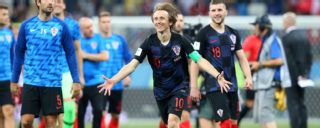|
Terabytes of digital storage have been devoted to the fact that this might be, if not the last World Cup for Lionel Messi and Cristiano Ronaldo, then certainly the last one with a realistic chance to win at as headliners. (Not pointing fingers, I wrote one of those pieces, too.) But the game doesn't exist up just in the rarefied atmosphere those two inhabit. There's a level not that far below, inhabited by folks who might not be GOAT candidates but nevertheless dare to dream and do not place limits on what they and their teammates might achieve. That's where Luka Modric lives. Odds are, nobody outside of Croatia has written paeans about this being his final World Cup -- he'll be 37 when Qatar 2022 rolls around -- but in his own way he had to come to terms with it, just like Messi and Ronaldo. And while he knew what his head told him -- Croatia might get out of the group, but their run would likely end in the round of 16, maybe the quarterfinals -- he was still going to believe in the seemingly impossible. Because, otherwise, why even both showing up? This is the World Cup. This is a chance to sear memories into the hearts and minds of people around the world, particularly his people, both back home and in the global Croat diaspora. This is something that no amount of European Cups (and, remember, he has four of them at home) can compare to. Sunday's game was stuck at 1-1 and there was little of the creative, free-flowing Croatia we had seen in previous outings. Age Hareide's Denmark had shackled them and turned the game distinctly uncomfortable after the early exchange of goals. In fact, relative to the previous outings, it was about as comfortable as being stuck in an economy-class seat with your leg in a cast for a flight from L.A. to Sydney and the full collection of Lars von Trier's work playing on the in-flight entertainment system. "Nobody had a good time during that game," Croatia boss Zlatko Dalic said. "Not me on the sidelines, not the players on the pitch, not the fans in the stands, not the millions watching at home. Nobody." And so you can only imagine Modric's heart jumping when, four minutes from the end of extra time, he spotted the opening. The sort of opening only those like him can see and, especially, the ones only those like him can see so early. A weighted vertical pass up the gut for Ante Rebic's legs, even after nearly two solid hours of football to find the extra kick to latch on to, and suddenly his teammate is one-on-one with the big yellow cloud otherwise known as Kasper Schmeichel. Rebic's shimmy and swerve put Schmeichel on his backside and, just as he was about to shoot, Mathias Jorgensen's desperate tackle sent Rebic tumbling to the ground. Stonewall penalty. Yes, this is it. It is meant to be. Modric trotted to the spot, and after a brief run-up, screwed his spot kick into Schmeichel's large frame. The chance was gone. It is not meant to be. "We all thought back to 2008 and that match with Turkey in Vienna," Dalic said afterward. Maybe Modric did not. Maybe he blocked it out of his mind. But if he didn't -- and it's hard to see how he could not -- then he's an even bigger man for wrestling with it and overcoming it. What happened in 2008 was that Croatia reached the quarterfinals of the European Championship against Turkey and, after a tight affair, took the lead with a minute to go in extra time, only to be pegged back with a dramatic injury-time goal. It went to penalties. Modric, just 22 at the time but already a shining light, stepped up first and missed. Croatia went out. Most of his teammates watched on TV that night. They knew what had happened. And they must have wondered, like Dalic wondered, whether we'd get a similar finale. Danijel Subasic and Schmeichel each saved the first penalties. Then Simon Kjaer and Andrej Kramaric converted theirs, as did another veteran Dane, Michael Krohn-Dehli. Slowly but steadfastly, Modric emerged from the knot of Croatian players at the halfway line, tied together in a group hug that was as much about warding off fear and generating confidence as anything else. Was he really going to have another go? "As soon as the final whistle went, he came to me and said, 'I am taking one of the penalties,'" Dalic said. "I am awed by his determination, his sense of responsibility. He was our hero." Modric duly buried it. He had done his part. Now it was all about his teammates, particularly the lanky Subasic. The rest was the usual frighteningly Edgar Allan Poe-esque pendulum, swinging from elation to despair in the pit of your stomach. Subasic saved Lasse Schone's shot by flying to his right. Schmeichel responds by denying Josip Pivaric. Subasic goes the wrong way on Nicolai Jorgensen, but somehow conjures up a dramatic kick save. And then, for the win, Ivan Rakitic. And Croatia spill onto the pitch, burying poor Subasic under a black (the starters) and blue (the reserves) human pile which, you imagine, left him black and blue as well. Modric celebrated with them, then ran over to applaud the Croatia supporters behind the goal at the far end. And then he sought his daughter, Ema, a 5-year-old mini-me. As he embraced her, you like to think he whispered something in her ear. Maybe something like this: "Daddy's not done ... and Daddy is not afraid of mistakes ... because when he gets knocked down, he gets right back up and stares fear in the face and fear blinks first." And then he disappeared with his teammates. There's a Russian bear to slay next.
|

